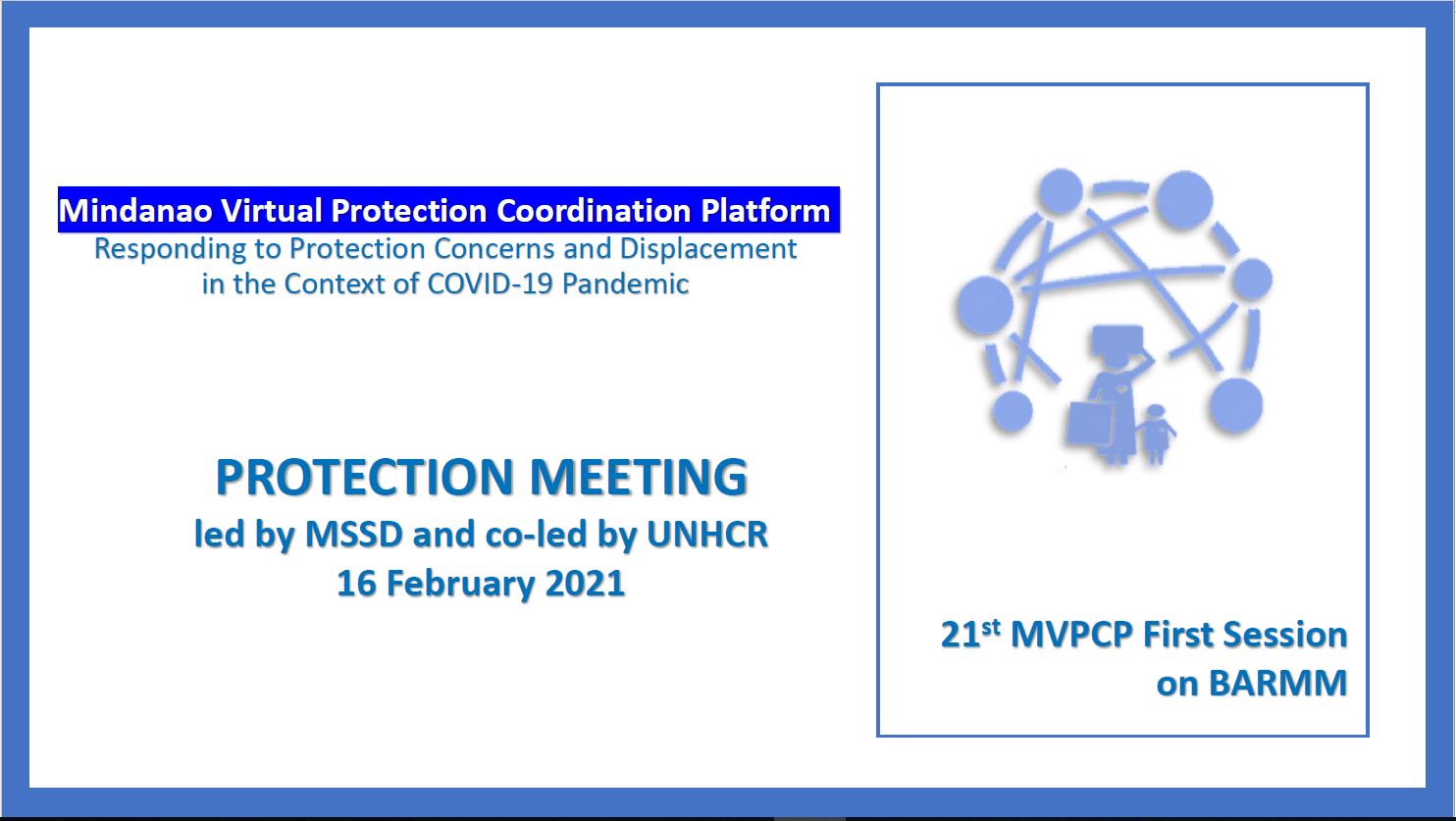21st Mindanao Virtual Protection Coordination Platform (MVPCP) Meeting
There are 93,162 individuals currently displaced in Bangsamoro Autonomous Region in Muslim Mindanao (BARMM), with armed conflict, clan feud and violence, and natural disaster as primary causes for recent and protracted displacements. For non-BARMM areas, 182,347 individuals remain displaced. This is a nominal decrease from the recorded 182,924 displaced persons in the last reporting period. The majority number of displacements are brought about by recent flooding and earthquakes which occurred within the five regions covered by non-BARMM areas.
The Ministry of Social Services and Development (MSSD) BARMM presented the status report on displacement in Maguindanao. The number of IDPs has reduced due to the return of IDPs in various municipalities (Mamasapano, Talayan, Datu Hoffer, South Upi). However, there are new displacements occurred in Sitio Wato, Brgy. Masulot and Sultan sa Barongis Municiplality on 15 February. On a different note, the 272 displaced families from Datu Odin Sinsuat have locally integrated in their host communities in Datu Blah Sinsuat. The identified needs and gaps are as follows:
-Regular ration of food packs in all areas (sacks of rice were provided by MSSD Maguindanao)
-Provision of sleeping kits and other essential non-food items in the evacuation centers in Mamasapano ( by MSSD Maguindanao provided non-food items)
-Provision of folding beds (MSSD Maguindanao provided folding beds)
-Emergency latrines in the evacuation centers
-Provision of potable water for drinking
-Strengthening of the camp coordination and camp management in AMARDI and Saniag Evacuation Centers (ECs) in Ampatuan
-Strengthening coordination with other partner agencies and LGUs
Likewise, the housing projects in Datu Pandan, Fugotan, Talayan and Datu Hoffer Municipalities are in need of WASH facilities. MSSD is requesting partners to provide assistance in improving the WASH facilities (e.g., latrines) in ECs, particularly in Mamasapano and Ampatuan, as these are identified sites for evacuation.
On the sectoral issues raised during the joint Task Force Bangon Marawi- Mindanao Humanitarian Team (TFBM-MHT) meeting in Lanao del Sur, Asec. Castro shared that the government is looking into the possibility of procuring a vehicle which will assist in desludging the latrines in ECs and transitory sites (TS) and said vehicle shall eventually be turned over to the local government unit. Apart from this, there is still continuous advocacy on the identified residual issues needing immediate responses from relevant government agencies. TFBM encouraged the MHT members to coordinate with the BARMM government for the latter’s greater involvement in Marawi Rehabilitation.
For BaSulTa provinces, The Municipal Peace and Order Council (MPOC) advised the 43 displaced families from Brgy. Bohebaca in Basilan that they can safely return to their residences. Out of the 43 displaced families 41 have already returned home, while the two remaining families have not yet returned to their residences. MSSD is requesting partners and relevant government agencies to respond to the residual and sectoral needs of displaced families in Basilan. In Sulu, around 751 protractedly displaced families are scheduled to return to their places of origin after three years of being displaced. These families belong to various barangays – Buhanginan, Pansul and Panglayahan, all in Patikul Municipality. UNHCR, through IRDT, will be distributing core relief items for the returning families. MSSD is requesting partners to augment the assistance (i.e. shelter assistance and housing repair materials) provided to the displaced families in Patikul, Sulu, especially those returning to their places of origin through Balik-Barangay Program by the LGU.
The Department of Social Welfare and Development (DSWD) Regional Offices and City Social Welfare Offices are continuously monitoring the number of displaced families temporarily seeking shelter in camps and ECs and their urgent needs. In Kidapawan City, there is an ongoing validation on the displaced families. As of reporting, 196 families that were displaced due to the earthquake last 2019 were accommodated by their relatives, while the others have returned to their houses situated in high-risk areas. These families are the same families who evacuated and proceeded to lowlands last 7 February 2021 earthquake. DSWD provided food packs, relief kits and trapal and the Disaster Response Division of DSWD Region XII provided additional trapal and sleeping kits. MMI also requested assistance to partners, such as solar lamps, trapal, relief kits if massive evacuation will occur. Office of Civil Defense Region XII expressed providing assistance to the displaced families.
Regarding the 2019 earthquake, approximately 611 relocation houses were built- around 356 were already occupied and around 42 vacant houses are for awarding (in Brgy. Ilomavis). In Brgy. Nalapan, 107 relocation houses are for turn-over and in Brgy, Indangan, 77 out of 107 relocation houses were already turned over to displaced families. In Brgy. Balabag, the identified relocation site is not plausible for housing construction since it was identified as high-risk area. Action Against Hunger and International Organization for Migration provided assistance (WASH-related, cash, hygiene kits, psychosocial assistance) to the mentioned barangays.
In Region XII, there are two minor displacement incidences (13 February 2021) in General Santos City- flash flood in Brgy, Fatima and Brgy. Tumbler in General Santos City- with approximately 187 families affected. Upon validation of the team, there are two existing ECs in Brgy. Tumbler (occupied by around five families) and around 57 families (approximately 275 individuals) are staying in an elementary school. For DSWD Field Office IX, it has provided family food packs and augmentation activities in Tawi-Tawi and Sulu. Around 3,500 family food packs are scheduled to be distributed to displaced families in Sulu and Tawi-Tawi who were affected by flash floods and storm surge. For more information, please download the 21st MVPCP presentation.
UNHCR Philippines is working closely with key government agencies in providing response activities and services to the families forcibly displaced, ensuring that protection is at the center of all humanitarian responses. UNHCR remains steadfast in staying and delivering, especially in these unprecedented times.

